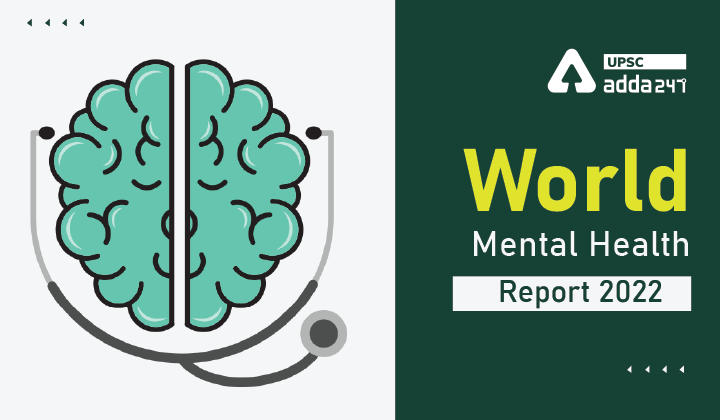Table of Contents
Mental health UPSC: Relevance
- GS 2: Issues relating to development and management of Social Sector/Services relating to Health, Education, Human Resources.
WHO report on mental health: Context
- Recently, WHO has released its largest review of world mental health since the turn of the century where it has provided blueprint for various stakeholders with an ambition to support the world in transforming mental health.
World Mental Health Report: Key points
- In 2019, around a billion people were suffered with mental disorder. Worryingly, the population included 14% adolescents.
- Suicide accounted for more than 1 in 100 deaths and 58% of suicides occurred before age 50.
- Mental disorders are the leading cause of disability, causing one in six years lived with disability.
- The report finds that people with severe mental health conditions die on average 10 to 20 years earlier than the general population, mostly due to preventable physical diseases.
- The major causes of depression include childhood sexual abuse and bullying victimization.
- Major threats to mental health: Social and economic inequalities, public health emergencies, war, and the climate crisis.
Issues with mental health
- Stigma, discrimination and human rights violations against people with mental health conditions.
- 20 countries still criminalize attempted suicide.
- Poorest and disadvantageous section of society are at greatest risk of mental ill-health and least likely to receive adequate services.
- Even in high-income countries, only one third of people with depression receive formal mental health care.
World Mental Health Report: Recommendations
- Step us investment in mental health along with committed leadership, pursuing evidence-based policies and practice, and establishing robust information and monitoring systems.
- Reshape environments that influence mental health, including homes, communities, schools, workplaces, health care services, natural environments.
- Mental health care needs to be strengthened by changing where, how, and by whom mental health care is delivered and received.
- Care options need to be diversified and scaled up for common mental health conditions such as depression and anxiety, which has a 5 to 1 benefit – cost ratio.
Steps taken to improve mental healthcare
- Globally:
- WHO:
- launched ‘Mental Health Atlas’ in 2017.
- WHO Special Initiative for Mental Health (2019-2023): Universal Health Coverage for Mental Health to ensure access to quality and affordable care for mental health conditions in 12 priority countries to 100 million more people.
- Target 3.4 and 3.5 of the Sustainable Development Goals (SDGs) talk about reducing mental health illness for the global community.
- WHO:
- Indian government:
- National Mental Health Program (NMHP), 1982: to improve the status of mental health in India, focusing on three main components:
-
- Treatment of the Mentally ill,
- Rehabilitation and
- Prevention and promotion of positive mental health.
-
- The Mental Health Care Act (MHCA) 2017: repealed the Mental Health Act, 1987. It seeks to ensure the person’s rights with mental illness to receive care and live a life with dignity.
- Decriminalizes suicide under section 309 of the Indian Penal Code: by presuming a suicidal person to be “suffering from severe stress’’. The person will also not subject to any investigation or prosecution.
- Right to mental healthcare: is provided under the Act to ensure access to mental healthcare facilities to suffering individuals.
- National Mental Health Program (NMHP), 1982: to improve the status of mental health in India, focusing on three main components:




 TSPSC Group 1 Question Paper 2024, Downl...
TSPSC Group 1 Question Paper 2024, Downl...
 TSPSC Group 1 Answer key 2024 Out, Downl...
TSPSC Group 1 Answer key 2024 Out, Downl...
 UPSC Prelims 2024 Question Paper, Downlo...
UPSC Prelims 2024 Question Paper, Downlo...
